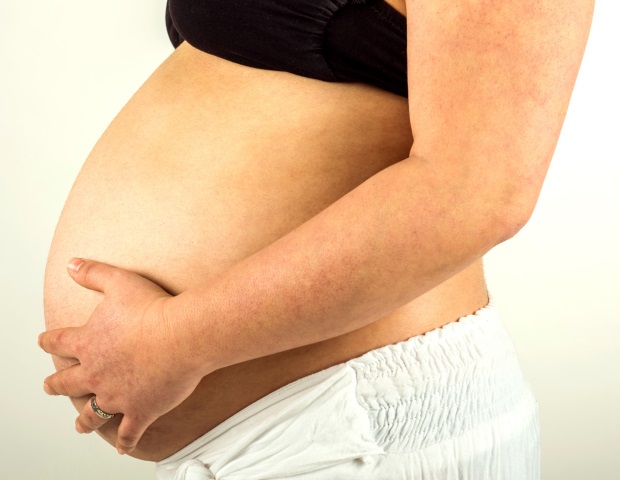While stretch marks are commonly associated with pregnancy, the persistence of skin lesions causes significant embarrassment to pregnant women and pregnant individuals, which, according to a new study, can negatively impact pregnancy and their quality of life.
Michigan Medicine researchers surveyed more than 100 pregnant patients with stretch marks considering childbirth at Von Voigtlander Women’s Hospital. Nearly 75% of participants said they had moderately or significantly noticeable stretch marks, and more than a third said they felt “a lot” or “moderately” embarrassed about the lesions.
Women were very concerned about the persistence of lesions, which are often associated with negative feelings and self-consciousness. The women who said they felt embarrassed were also more likely to report the lesions affecting other areas of their lives such as social activities, self-esteem and clothing choices. “
Frank Wang, MD, senior author of the article, and William B. Taylor Endowed Professor of Clinical Dermatology at Michigan Medicine
Wang began examining striae gravidarum, or stretch marks, about 15 years ago. He and his team searched for the molecular mechanisms that cause the lesions and found that they exhibit significant changes in collagen and elastic fibers, components of the skin that are responsible for firmness and elasticity.
For reasons his team is still investigating, these skin components are damaged and never completely regress, resulting in permanent lesions. This unsolved problem was a major concern of 75% of pregnant women interviewed for the study published in the International Journal of Women’s Dermatology.
“While there are some ways to reduce intense redness or texture from stretch marks, there is very little scientific evidence that any intervention completely prevents or treats lesions,” said Wang. “None of these procedures completely erase stretch marks and they can be very expensive.”
Stretch marks and the concerns about developing them can contribute to depression or anxiety in the perinatal period, which affects up to one in seven women during pregnancy and after childbirth, says Megan Lawlor, MD, co-author of the article and assistant professor of obstetrics and Gynecology in the Department of Maternal Fetal Medicine at Washington University in St. Louis.
“If left uncontrolled or untreated, perinatal depression can lead to poor pregnancy or neonatal outcomes,” Lawlor said. “Bringing attention to the emotional and psychological effects of stretch marks on patients can hopefully help identify and treat mental disorders during pregnancy and pregnancy in the postpartum period. “
For years, stretch marks have been an avoidance issue that many women try to hide, says Timothy Johnson, MD, co-author of the article and Arthur F. Thurnau Professor of Obstetrics and Gynecology at Michigan Medicine.
“Pregnant women talk to me about stretch marks at the clinic every week, and it’s time to break the stigma and speak openly about them with all patients,” said Johnson. “Many of the women said that the stretch marks caused similar or more emotional distress than other skin problems such as acne, eczema and psoriasis. This study gives us the opportunity to normalize stretch marks associated with all other dermatological conditions.”
Wang continues to study stretch marks at the molecular level and is currently enrolling participants in a study examining how the earliest stretch marks develop. The study includes skin biopsies taken as soon as they form during pregnancy. Wang said the current paper on the emotional effects of stretch marks is evidence that his continued research is vital for many patients and will further motivate his team to find answers.
“This is an issue that is very important to many pregnant people and that should show future research sponsors that it is worth investing resources,” he said. “Our hope is that by registering enough participants, we can generate precision data that can be translated into rational therapies that prevent or effectively treat stretch marks.”
In the meantime, doctors need to carefully question parents about their individual physical and mental health issues when assessing their wellbeing, as parents are less likely to express spontaneous concerns that are associated with feelings of shame or embarrassment, says Samantha Shaw, MD, clinical instructor and perinatal psychiatrist Michigan Medicine.
“In our diagnosis and treatment, we tend to have a strong focus on the challenges they face in caring for and bonding the child,” Shaw said. “We need to support pregnant parents and ask how their bodies have gone through the process of pregnancy, labor, and delivery so that we don’t miss important pieces of history and important goals of their treatment.”
Source:
Michigan Medicine – University of Michigan
Journal reference:
Karhade, K., et al. (2021) Negative Perceptions and Emotional Effects of Striae Gravidarum in Pregnant Women: Emotional Effects of Striae Gravidarum. International Journal of Women’s Dermatology. doi.org/10.1016/j.ijwd.2021.10.015.

